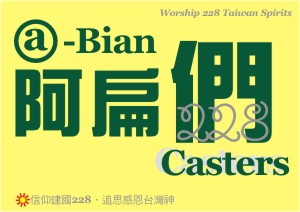Published on Taipei Times
http://www.taipeitimes.com/News/editorials/archives/2008/07/07/2003416747
THE LIBERTYTIMES EDITORIAL: Saving Taiwan by alienating allies
Monday, Jul 07, 2008, Page 8
At a military ceremony last Monday, President Ma Ying-jeou (馬英九) stressed that his government must show Taiwan’s determination to protect itself by building up the army and preparing for war. Ma said that Taiwan must take responsibility for itself and save itself. He also said that while he hopes to establish good military relations with Taiwan’s allies, Taiwan itself holds the ultimate responsibility for building up our military. He believes that if the government can do that, the public will have faith in it and Taiwan’s allies will respect it.
Ma was convincing when he said this. However, in the month since his inauguration, his words and actions have made Taiwanese and allies alike question his intentions. A short time ago, the Defense News reported that the Chinese Nationalist Party (KMT) had told the US about its wish to temporarily stop military sales. The aim was to ensure smooth cross-strait negotiations and the arrival of Chinese tourists on direct-charter flights.
However, the way in which the government is getting increasingly close to China has made the US worry. While US Secretary of State Condoleezza Rice said that Washington supports the development of cross-strait relations, she also said that the relations between the US and Taiwan cannot be ignored or forgotten. Officials of the US Department of Defense have also warned that China’s People’s Liberation Army is continuing to increase its military deployment in the Taiwan Strait.
Japan has also started to worry about Ma getting closer to China while moving further away from the US and Japan. The Yomiuri Shimbun recently published an article saying that Ma is trying his hardest not to criticize China and is placing an emphasis on improving cross-strait relations above everything else. The report said that in terms of security, Ma is trying to avoid relying on the US and Japan and that he primarily views Japan as an economic partner.
When a Japanese coast guard patrol boat sank a Taiwanese fishing boat near the Diaoyutai (釣魚台) islands, the government stressed that the islands belonged to the “Chinese” people and even said that Taiwan would be prepared go to war with Japan over the Diaoyutai dispute if necessary. Ma did this because he no longer views Japan as an ally. In his inauguration speech, he focused on cross-strait relations and did not once mention Japan. This worried Japanese officials attending the inauguration and their concern is perfectly understandable.
These incidents show that Ma’s actions contradict his comments about making Taiwan more able to protect itself and establishing good military relations with our allies. Taiwan is in a difficult position and Beijing has still not given up the idea of taking over Taiwan. At the same time, it is within the interests of the US and Japan to see stability, peace and security in the Taiwan Strait.
As a safety mechanism, the US-Japan alliance is extremely important to Taiwan and any Taiwanese leader who puts Taiwan first would definitely give priority to Taiwan’s relations with both countries.
It is indeed a pity that the future of Taiwan’s security took a severe turn for the worse after May 20. Ma has put cross-strait relations above diplomacy and given priority to improving cross-strait ties. It turns out what he really means by improving cross-strait relations is sacrificing Taiwan’s sovereignty and agreeing with Beijing on its “one China” policy. Even if Ma says that the so-called “1992 consensus” means “one China with each side having its own interpretation,” he is still accepting the “one China” policy.
By accepting the “one China” policy and agreeing that Taiwan and China have always been parts of one China, Ma has not only shaken the position of countries that once supported Taiwan, like the US and Japan, but he also positions both of them as obstacles on his path toward eventual unification with the motherland. By seeing these former allies as obstacles, it is unavoidable that Ma will say and do things that make the US and Japan cautious. We really need to think hard about exactly what Ma means when he says “our country” and our “allies.”
In a diplomatic white paper released during the presidential campaign, Ma said he would continue to support the Treaty of Mutual Cooperation and Security between the US and Japan because it is an important security mechanism for East Asia. He criticized the Democratic Progressive Party for squandering the trust that once existed between Taipei and Washington.
But after a little more than a month in power, Ma has made it obvious to Japan that he is getting close to China and is moving away from the US and Japan. Remember how Ma said that he was confident he could bring “a century of prosperity and stability to Taiwan” as long as he could have eight years in power? By listening to what he has said and looking at what he has done, the prosperity and stability he was referring to must mean “eventual unification” with China.
Must the people of Taiwan quietly accept this? Must they allow Ma to use China’s massive economy as an excuse to ruin Taiwan’s future and prosperity? Ma vowed to “protect the nation” in his inauguration speech. It will be interesting indeed to see just how many people are willing to keep a president in power who has gone back on his word.
Translated by Drew Cameron
Copyright © 1999-2008 The Taipei Times. All rights reserved.
2008年7月7日 星期一
China’s People’s Liberation Army
Subscribe to:
張貼留言 (Atom)



0 Comments:
Post a Comment